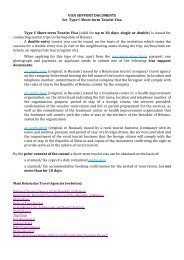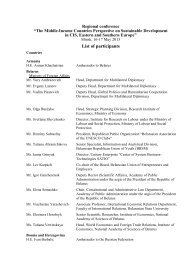A common featureof countries thathave brought abouttransformationaldevelopment is a strong,proactive state—also referred to as a“developmental state”state needs to mobilize society through policiesand institutions that advance economic andsocial development.However, this is not a universal prescription.The way these three elements are translatedinto policies is context-specific, depending oncountry characteristics, government capacitiesand relationships with the rest of the world.Driver 1: a proactivedevelopmental state<strong>Development</strong> is about changing a society to enhancepeople’s well-being across generations—enlarging their choices in health, educationand income and expanding their freedoms andopportunities for meaningful participation insociety.A common feature of countries that havebrought about such transformations is astrong, proactive state—also referred to asa “developmental state”. The term refers to astate with an activist government and often anapolitical elite that sees rapid economic developmentas their primary aim. Some countriesgo further and add an additional feature: abureaucracy with the power and authority toplan and implement policies. High growthrates and improved living standards in turnprovide the state apparatus and the rulingelites their legitimacy. 7In some notable cases, development progressis guided by a long-term vision, shared normsand values, and rules and institutions that buildtrust and cohesion. Further, viewing developmentas transformation demands considerationof these intangible factors as well as an understandingof how they affect the organizationof society and interact with individual policiesand reforms.Country ownership of developmentstrategy, strong bureaucratic capacities andappropriate policies are essential elementsthat together shape the transformation process.8 Policies must be aimed at facilitatingtransformation by identifying barriers to andpotential catalysts of changes. In this process,institutions, societies and individuals needto set their own objectives and identify thestrategies and policies that can achieve them.Although not pursued everywhere, broadparticipation of people, in the sense that theyare being listened to, that their views are takeninto account in decisionmaking and that theyare actively involved in setting the agenda, isconducive to sustainable long-term development—asis consistent political leadershipbacked by strong technocratic teams that canensure institutional memory and continuityof policy (box 3.2). 9There is no simple recipe for connectinghuman development and economic growthor for accelerating growth. 10 One study usingcross-country data for 1950–2005 foundthat the vast majority of takeoffs in growthare not generated by substantial economicreforms and that most substantial economicreforms do not yield takeoffs in growth. 11Successful countries have grown fast bygradually removing binding constraints toprogress, not by implementing a long list ofpolicies and reforms. The state has a criticalrole in that. Countries that have succeededin igniting sustained growth, have faceddifferent sets of challenges and adoptedvarying policies on market regulation, exportpromotion, industrial development and technologicaladaptation and progress. 12 When acountry is already growing fast, the challengeis to remove or anticipate future constraintsas they become actually or potentially binding.Positive terms of trade shocks, like therecent commodity boom as a result of therise of the South, can help begin growthacceleration but not sustain it. However,focused economic and institutional reformsappear to have statistically and quantitativelysignificant impacts on how sustained growthaccelerations are. 13In many high-performing developingcountries, the state operates differently fromthe conventional welfare state, which aims tocorrect market failures and build social safetynets while promoting market-led growth.Instead, developmental states have been proactive:initiating and monitoring transformationsin people’s lives. 14 Rather than merelybeing market-friendly, these states have beendevelopment-friendly. Those with strong,innovative social programmes are often alsopeople-friendly —a necessary progression inthe move from a focus on growth to humandevelopment.66 | HUMAN DEVELOPMENT REPORT <strong>2013</strong>
BOX 3.2What is a developmental state? Need it be authoritarian?The recent literature on developmental states has grown out of the experiencesof the East Asian “miracle” economies: Japan before the SecondWorld War and Hong Kong, China (SAR), the Republic of Korea, Singaporeand Taiwan Province of China in the second half of the 20th century.Recently, China and Viet Nam (as well as Cambodia and Lao PDR) can beseen as developmental states. Common traits include promoting economicdevelopment by explicitly favouring certain sectors; commanding competentbureaucracies; placing robust, competent public institutions at the centre ofdevelopment strategies; clearly articulating social and economic goals; andderiving political legitimacy from their record in development.That some East Asian developmental states were not democracies hasprompted many to think that the developmental state model is also autocratic.But evidence of the relationship between authoritarianism and developmentis mixed. Democratic countries such as Japan and the UnitedStates have functioned as developmental states. After the Second WorldWar France initiated planning by the Planning Commission, with sectoralindustrial policy led by elite bureaucrats and the aggressive use of stateownedenterprises. Since the 1950s, the Scandinavian countries have alsoacted as a type of developmental state, where political legitimacy is derivedfrom the welfare state and full employment rather than from rapid growth.The Swedish state developed strategic sectors through public- private partnerships(iron and steel, railways, telegraphs and telephone, and hydroelectricpower). It also provided targeted protection to support the emergenceof heavy industries, promoting research and development. Its welfare policywas closely integrated with strategies to promote structural change towardshigh-productivity sectors.The United States has a long history of being a developmental state, goingback to the early days of the republic. Alexander Hamilton, the first UStreasury secretary, is widely considered the father and inventor of the infantindustry argument. Between 1830 and 1945, the United States had some ofthe highest trade barriers in the world. In the same period it invested heavily ininfrastructure (Pacific railways, Midwestern canals and agricultural infrastructure),higher education, and research and development. Even after the SecondWorld War, when the United States had attained industrial supremacy, anddespite the rise of market fundamentalism, the developmental state survived.Block (2008) argues that the state has focused on translating cutting- edgetechnological research into commercial use through cooperation among a networkof people with high levels of technological expertise situated in stateagencies, industries, universities and research institutions. <strong>Development</strong>alismhas lived in the shadows of US policy because acknowledging the state’s centralrole in promoting technological change is inconsistent with the claim thatthe private sector should be left alone to respond to market signals autonomously.Yet, although limited in scope due to a lack of legitimacy, unstablefunding and other limitations caused by its “hidden” nature, the US developmentalstate has been quite successful. In many sectors, the United States hasdeveloped international competitiveness through public funding for researchand development and through public procurement for defence (computers, aircraft,Internet) and health (drugs, genetic engineering).Source: Evans 2010; Chang 2010; Edigheji 2010; Block 2008.Another characteristic of developmentalstates is their pursuit of industrial policies toredress coordination problems and externalitiesby “managing” comparative advantage. 15For example, the state may foster industriesbelieved to have a latent comparative advantageor seek to elevate those that are stuck in staticcomparative advantage. As a result, severalindustries that benefited from tariff protectionsubsequently succeeded in world markets. 16Nonetheless, it can be difficult to attributethe success or failure of a particular industryto specific trade policies because governmentinterventions are guided by multiple motives,from revenue generation to protection of specialinterests.Evidence across industries from studies of thebenefits of industry protection is ambiguous.However, there is a distinction between thegeneral desirability of “soft” industrial policies,such as improving infrastructure and technologicaladoption, and “hard” industrial policies,such as direct taxes and subsidy interventionsfavouring specific industries, whose efficacydepends on country circumstances. There is noglobal prescription, though: what worked inEast Asia may not work in Latin America.• Japan. Japan has long acted as a developmentalstate. By the 1870s, it had a groupof “well-educated, patriotic businessmenand merchants and government that werefocused on economic modernization”. 17Many subsequent reforms created the infrastructureof a modern country, including aunified currency, railroads, public educationand banking laws. The government builtand operated state-owned plants in industriesranging from cotton to shipbuilding.It also encouraged domestic production byraising import tariffs on many industrialproducts. Since the end of the Second WorldWar, Japan has undergone a fundamentaltransformation from aid recipient to donor(box 3.3).• Republic of Korea. Between 1960 and 1980,the Republic of Korea had significantOne characteristic ofdevelopmental states istheir pursuit of industrialpolicies to redresscoordination problemsand externalities by“managing” comparativeadvantageChapter 3 Drivers of development transformation | 67
- Page 1 and 2:
WNSEHuman DevelopmentReport 2013The
- Page 3 and 4:
Human Development Report 2013The Ri
- Page 5 and 6:
Human Development Report 2013 TeamD
- Page 7 and 8:
Finally, the Report also calls for
- Page 9 and 10:
Heather Simpson, Ben Slay, Mounir T
- Page 11 and 12:
3.6 India’s Supreme Court issues
- Page 13 and 14:
OverviewOne of the most heartening
- Page 15 and 16:
and sustainability are fully incorp
- Page 17 and 18:
Without investment in people, retur
- Page 19 and 20:
opportunity to reap the full benefi
- Page 21 and 22:
Woods institutions, the United Nati
- Page 23 and 24:
IntroductionWhen developed economie
- Page 25 and 26:
leading economies—Brazil, China a
- Page 27 and 28: comparable access to information, e
- Page 29 and 30: mobile phones: cellular banking is
- Page 32 and 33: “The political problem ofmankind
- Page 34 and 35: BOX 1.1Fairness, macroeconomics and
- Page 36 and 37: BOX 1.3Amartya Sen, Nobel Laureate
- Page 38 and 39: FIGURE 1.1Income per capita is risi
- Page 40 and 41: BOX 1.4Subjective indicators of wel
- Page 42 and 43: FIGURE 1.4There is notable variatio
- Page 44 and 45: FIGURE 1.6Most regions show declini
- Page 46 and 47: Progress in humandevelopment achiev
- Page 48 and 49: BOX 1.7Social competencies: human d
- Page 50 and 51: TABLE 1.3Inequality and satisfactio
- Page 52 and 53: Not all countries havethe precondit
- Page 54 and 55: “When the music changes,so does t
- Page 56 and 57: BOX 2.1The South’s integration wi
- Page 58 and 59: FIGURE 2.1As a share of world merch
- Page 60 and 61: BOX 2.2Acquisitions by the South of
- Page 62 and 63: FIGURE 2.3Between 2000 and 2010, In
- Page 64 and 65: FIGURE 2.4Export earnings per capit
- Page 66 and 67: BOX 2.6Final assembly is about more
- Page 68 and 69: Instead of having a centreof indust
- Page 70 and 71: FIGURE 2.6Emerging market economies
- Page 72 and 73: Developing countriestrade more amon
- Page 74 and 75: “We cannot expect thatall nations
- Page 76 and 77: TABLE 3.1Selected developing countr
- Page 80 and 81: More important thangetting prices r
- Page 82 and 83: BOX 3.5Eastern Europe and Central A
- Page 84 and 85: States have to beconscious that the
- Page 86 and 87: As countries develop,they tend to d
- Page 88 and 89: Having weathered theAsian financial
- Page 90 and 91: Providing publicservices that contr
- Page 92 and 93: Advancing health requiresmore than
- Page 94 and 95: Universal public healthand educatio
- Page 96 and 97: • China. The Minimum Livelihood G
- Page 98 and 99: “Each generation will reap whatth
- Page 100 and 101: concerns will make for a complex en
- Page 102 and 103: A greater emphasison education cans
- Page 104 and 105: FIGURE 4.1Under the fast track scen
- Page 106 and 107: Around the worldpeople are calling
- Page 108 and 109: FIGURE 4.4Different environmental s
- Page 110 and 111: FIGURE 4.5Education policies can al
- Page 112 and 113: BOX 4.2China and Ghana: who benefit
- Page 114 and 115: FIGURE 4.8countries thus converge t
- Page 116 and 117: “Let us join hands to try tocreat
- Page 118 and 119: Areas of globalinternational concer
- Page 120 and 121: Addressing climatechange requires t
- Page 122 and 123: International governanceis increasi
- Page 124 and 125: BOX 5.2Jo Leinen, Member of the Eur
- Page 126 and 127: facilitates reserve investments and
- Page 128 and 129:
Responsible sovereigntytakes the lo
- Page 130 and 131:
FIGURE 5.1Under the accelerated pro
- Page 132 and 133:
Good policymakingrequires greater f
- Page 134 and 135:
A fair and less unequalworld requir
- Page 137 and 138:
NotesOverview1 Atsmon and others 20
- Page 139 and 140:
25 Blinder 2006.26 UNIDO 2009.27 UN
- Page 141 and 142:
which is 61.7 deaths per 1,000 live
- Page 143 and 144:
ReferencesAbdurazakov, A., A. Minsa
- Page 145 and 146:
urban_world_cities_and_the_rise_of_
- Page 147 and 148:
Kamau, P., D. McCormick, and N. Pin
- Page 149 and 150:
Labor Administration. Geneva: Inter
- Page 151 and 152:
Human Development Report 2013The Ri
- Page 153 and 154:
Statistical acknowledgementsThe Rep
- Page 155 and 156:
Key to HDI countries and ranks, 201
- Page 157 and 158:
Human Development Report 2013The Ri
- Page 159 and 160:
Human Development Report 2013The Ri
- Page 161 and 162:
Human Development Report 2013The Ri
- Page 163 and 164:
Human Development Report 2013The Ri
- Page 165 and 166:
Human Development Report 2013The Ri
- Page 167 and 168:
Human Development Report 2013The Ri
- Page 169 and 170:
Human Development Report 2013The Ri
- Page 171 and 172:
Human Development Report 2013The Ri
- Page 173 and 174:
Human Development Report 2013The Ri
- Page 175 and 176:
Human Development Report 2013The Ri
- Page 177 and 178:
Human Development Report 2013The Ri
- Page 179 and 180:
Human Development Report 2013The Ri
- Page 181 and 182:
Human Development Report 2013The Ri
- Page 183 and 184:
Human Development Report 2013The Ri
- Page 185 and 186:
Human Development Report 2013The Ri
- Page 187 and 188:
Human Development Report 2013The Ri
- Page 189 and 190:
Human Development Report 2013The Ri
- Page 191 and 192:
Human Development Report 2013The Ri
- Page 193 and 194:
Human Development Report 2013The Ri
- Page 195 and 196:
Human Development Report 2013The Ri
- Page 197 and 198:
Human Development Report 2013The Ri
- Page 199 and 200:
Human Development Report 2013The Ri
- Page 201 and 202:
Human Development Report 2013The Ri
- Page 203 and 204:
Human Development Report 2013The Ri
- Page 205 and 206:
Human Development Report 2013The Ri
- Page 207 and 208:
Human Development Report 2013The Ri
- Page 209 and 210:
Human Development Report 2013The Ri
- Page 211 and 212:
Statistical referencesADB (Asian De
- Page 213 and 214:
Core features of the model pertinen
- Page 215 and 216:
Countries and HDI ranks in 2012 and
















